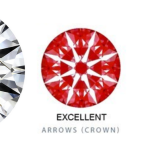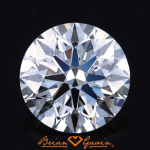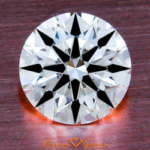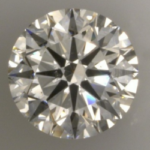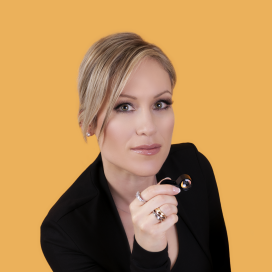Why Is Buying A Diamond So Damn Difficult?
 Ask any guy who is just got engaged how he bought the ring and he’ll likely wince followed by a long winded tale of research, stress, comparison shopping, stress, budget concerns, stress, stress and more stress. I know because I deal with these poor guys everyday.
Ask any guy who is just got engaged how he bought the ring and he’ll likely wince followed by a long winded tale of research, stress, comparison shopping, stress, budget concerns, stress, stress and more stress. I know because I deal with these poor guys everyday.
Ever since diamonds were first discovered in India many centuries ago, we have had a fascination with the translucent crystallized version of carbon crystal. Yet, the diamond industry is a peculiar place, filled with unregulated and non-commoditized goods that has long been shrouded in secrecy and conspiracy. Which begs the question – Why is buying a diamond so damn difficult?
Everyone knows of De Beers’ infamous monopoly over the industry and their ingenious marketing strategy that forever changed our cultural traditions for engagement and weddings. Who can argue that diamonds are now the defacto symbol for purity, eternal love and undying loyalty? Just look at any average housewife’s left hand and you’ll see testament to this.
Thanks De Beers.
Of course, it isn’t a surprise that diamonds are the chosen gemstone of choice. Of all the precious gems, diamonds are the most highly prized due to their unrivaled adamantine luster, durability, and rarity. Diamonds possess extraordinary brilliance and shine, are extremely durable, and of course are difficult to mine, cut, and polish. Only a diamond can cut a diamond and finding a gem worthy diamond is akin to finding a needle in a haystack (the haystack being approximately 250 tons of rough mined ore). Perhaps the strongest reason why diamonds are valued so highly as a gem material is due to their universal acceptance of their symbolic reference for prestige, wealth, and status.
So whether or not you agree that diamonds are the most beautiful and highly valued gemstone, it is a fact that they comprise a huge industry with plenty of consumer attention. This industry has three main components namely; exploration and production which produces the rough diamond market and sales, cutting and polishing which produces polished diamond sales, and finally jewelry manufacturing and retail sales. All along the way each producer must make a profit and the largest margins are usually gained through retail.
According to Diamondfacts.org, the diamond industry employs roughly 10 million people around the world (both direct and indirect) with global diamond jewelry sales worth in excess of 72 billion dollars. It’s a massive industry with many consumers playing their part. However isn’t it odd that the average person doesn’t have a clue about how to purchase a quality diamond?
The average person doesn’t have a clue on how to buy a quality diamond. – Liz Hancock
Blood Diamonds, Diamond Districts, And Corrupt Gem Labs…
The diamond industry has long been known for it’s secrecy and somewhat unethical practices. Whether you are referring to blood diamonds and the subsequent enactment of the Kimberley Process, diamond districts with cash only transactions and/or undisclosed diamond treatments, retail store commoditization of low quality diamonds, or gem labs being known to over inflate a diamond’s grade report just to swindle uninformed consumers, the industry is rife with conspiracy.
It is for these reasons that many consumers are rightfully wary of where to purchase a quality diamond, much less how to go about evaluating one. In today’s technological age, we can go online and read reviews for just about anything. Thinking of buying a new car? No problem. Need to understand which home appliance offers the best efficiency at a low operating cost? That’s easy. But diamonds are a very unique product in that they cannot be evaluated as a group. Each diamond is a one-of-a-kind natural crystal each as different and varied as the proverbial snowflake or human fingerprint. It is impossible to group diamonds of a set shape, carat weight, color and clarity together and call them all the same. Though many retailers have done and continue to do this very thing.
So What Is The Average Consumer To Do?
The best advice that any consumer can take when it comes to buying diamonds is to first consider where you are purchasing your diamond from. This is critical and absolutely your highest priority. Evaluate and investigate your retailer with a fine tooth comb to understand how long they have been in business, what they hold in high esteem as far as business ethics go, the general education and expertise of their staff, and what level of quality their diamonds and jewelry are at. It’s important to read reviews from real customers to determine if they have the potential to earn your business.
Where you decide to buy your diamond from is the foundation to your entire diamond search and purchase success story. Consumers need to decide what their budget and expectations are for their diamond purchase. Are you happy with a diamond engagement ring that is already mounted and ready to be purchased the same day? Or are you looking for a more concierge service where they search for your perfect diamond according to your carat weight, color, cut, and clarity specifications? Are you looking for a plain four or six prong engagement ring or do you want a custom piece of jewelry that is one-of-a-kind? Consumers need to give some thought into what will make them happy.
In addition to your expectations, customer service is also a key component to your buying experience. Every jeweler knows the Pareto Principle; if they can win your business you’ll more than likely return to them in the future.
So, if you are a Millennial looking to purchase your first diamond engagement ring you’ll already know that buying a diamond is damn difficult. That’s stating the obvious. Unless you are the type of consumer that has the time and effort to spend countless hours of research and/or pursue a gemological degree, there will always be an information gap for you. The easiest and most stress free way to purchase your diamond gift is to choose a retailer that ticks all your boxes and is able to provide the level of service and quality of products that you expect.
Choose wisely and you’ll soon understand that your choice in a diamond retailer has a huge effect on your diamond search, buying experience, and long term satisfaction. Good luck!
Hey.You Want Ideal Cut Diamonds?
You've got it.
Join ODBA's Diamond Deal Friday and get handpicked diamonds every week from me to you.
No consultation required. Subscribe now!
ODBA Recommends
You May Also Like



